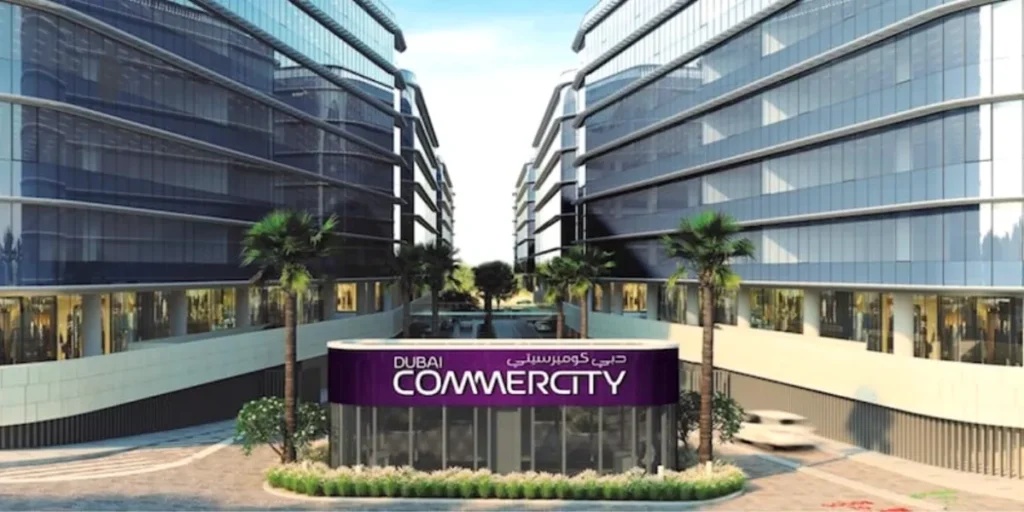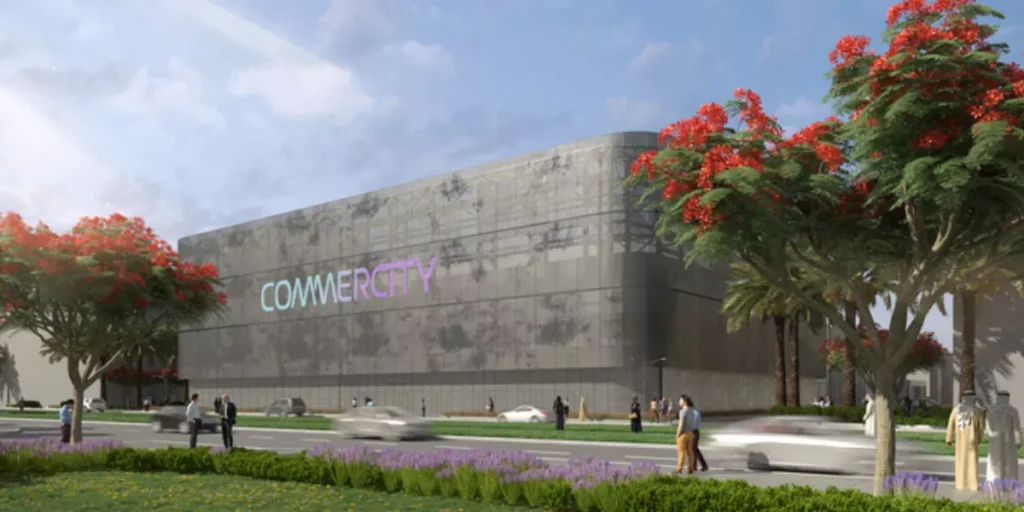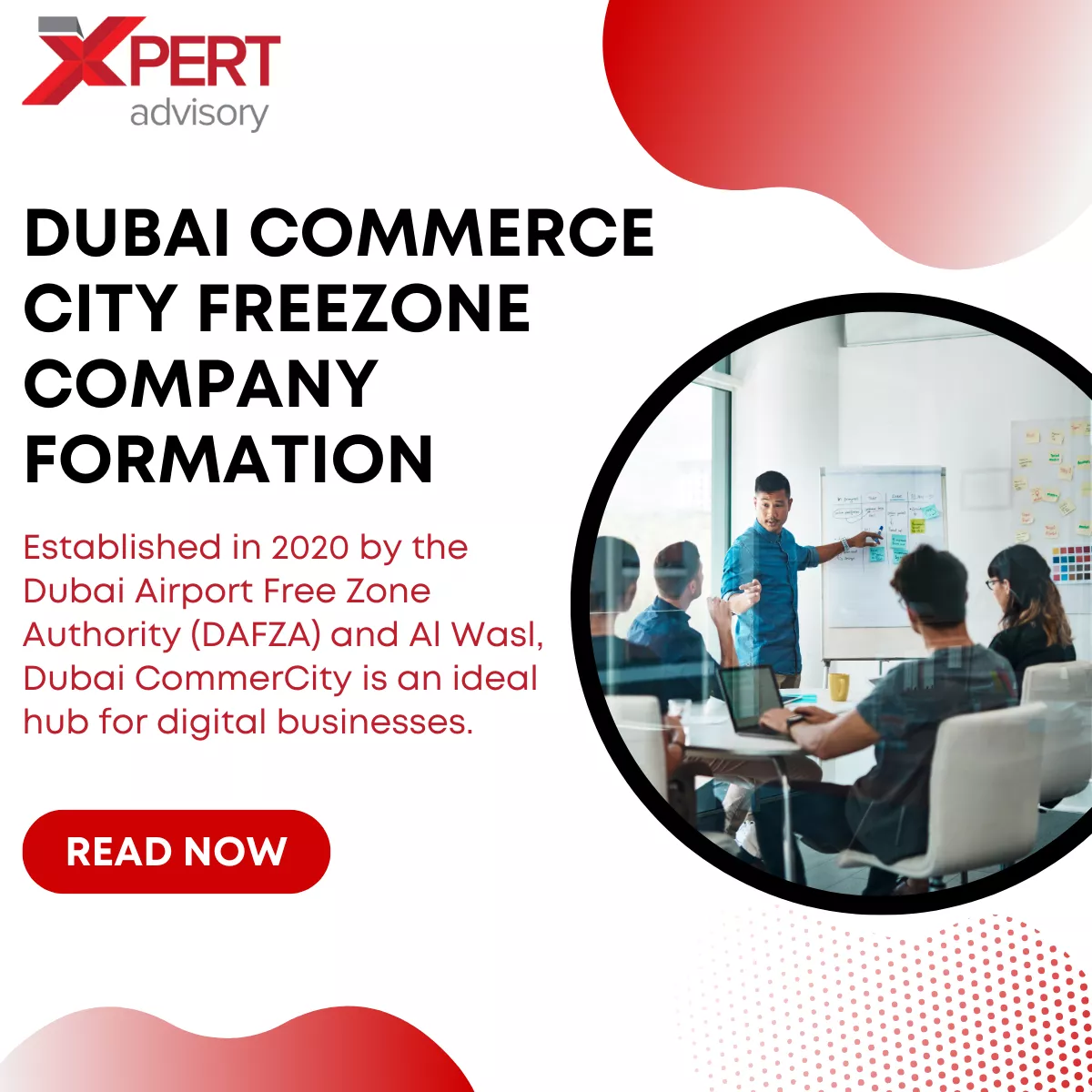Are you an entrepreneur looking to start a company in Dubai? Setting up your business can be challenging if you’re unfamiliar with the local regulations and opportunities. One fantastic option is the Dubai CommerCity Freezone, especially for those interested in eCommerce.
Dubai CommerCity was established in 2020 by the Dubai Airport Free Zone Authority (DAFZA) and Al Wasl, making it perfect for digital businesses. Its strategic location near Dubai International Airport ensures easy access to trade and logistics.
This blog will guide you through each step of setting up a company in this free zone. We’ll cover key benefits, types of licenses available, and detailed steps to get started. Read on to discover how Dubai Commerce City Freezone Company Formation can benefit your business!
Key Takeaways
- Dubai CommerCity, started in 2020 by DAFZA and Al Wasl, is a great place for eCommerce businesses. Its location near Dubai Airport helps with easy trade and logistics.
- DCC offers a wide range of benefits, including zero corporate and personal income taxes, no currency restrictions, and the ability to repatriate all profits. This makes it financially appealing.
- There are three types of business licenses: trading license (AED 61,870*), service license (starting at AED 28,945*), and industrial license. Each option comes with a different license fee and fits various business needs.
- For the DCC Free Zone company setup, choose your business activity, select a company name, pick the appropriate license type (trading, service, or industrial), then choose your company structure like PLC or FZCO.
- You need to gather permits and documents, such as passport copies and lease agreement and submit them to relevant authorities for approval to efficiently complete your setup process in a Free Zone in Dubai.
Key Benefits of Setting Up in Dubai CommerCity

Dubai CommerCity business setup offers many benefits. DCC Freezone offers a prime spot for digital commerce business and tax breaks.
Strategic location for eCommerce
Dubai CommerCity Freezone sits close to Dubai International Airport. It is a specialized e-commerce Free Zone, ideally suited for trading, e-commerce, and import-export operations. DCC provides a strategic platform for global e-commerce businesses to set up their businesses in the Middle East and Africa region.
The Free Zone is divided into three clusters: Business, Logistics, and Social. It features 240,000 sq.m of office space and 54,000 sq.m of logistics units. Twelve office buildings and large warehouses support efficient storage and last-mile delivery for e-commerce companies. Each cluster has its e-commerce regulations and caters to the needs of online businesses.
Tax exemptions and no currency restrictions
Businesses in Dubai CommerCity enjoy tax perks. Zero corporate and personal income taxes attract many companies. This allows entrepreneurs to keep more of their earnings. Companies can also repatriate 100% of their capital and profits, which adds financial freedom.
No currency restrictions simplify international trade. Companies can deal in any currency without limits or extra fees. These benefits make Dubai CommerCity a top choice for e-commerce ventures.
Types of Licenses Available in Dubai CommerCity
Dubai CommerCity provides various licenses for a wide range of business activities. These licenses support services like trading, manufacturing activities, and other related operations. The license cost in Dubai CommerCity varies according to the type of company formation and business activities.
Trading License

A trading license in Dubai CommerCity allows businesses to buy goods and sell them within the UAE and abroad. This license is ideal for general trading companies, retailers, and those involved in supply chain management. Businesses can benefit from tax exemptions and no currency restrictions.
The license cost for a Trading License with a 25 sq.m office space that includes three visas amounts to AED 61,870*. The minimum share capital requirement is AED 1,000*. Obtaining this license typically takes about four weeks.
This makes it straightforward to set up a DCC company. The government of Dubai is in the process of establishing a new free trade zone for e-commerce, known as “Dubai Commerce.” This zone will serve as a hub for online stores and the sale of goods online, strengthening the region’s position as a global leader in e-commerce.
Service License
A service license is ideal for businesses offering consultancy, IT services, or other professional services. Dubai CommerCity Freezone provides many benefits for these companies. You can enjoy tax exemptions and no currency restrictions.
The cost of setting up depends on the package you choose. A Smart Desk with a 2-visa quota costs AED 28,945*. Larger fitted physical offices with a 3-visa quota cost AED 72,645*. This setup includes the necessary permits and documentation to get your business running smoothly in the digital economy.
Choose a service license if your focus is on providing specialized skills or consulting services in Dubai CommerCity Freezone’s innovative environment.
Industrial License
An industrial license in Dubai CommerCity allows you to engage in manufacturing activities. You can produce or assemble goods within the free zone. This type of license suits businesses involved in making physical products.
The minimum share capital requirement for setting up is AED 1,000*. Companies with an industrial license enjoy tax exemptions and no currency restrictions. They also benefit from no export duties and access to warehousing facilities.
Applying for an industrial license involves choosing your business activity and the legal structure of the company first. Then, you need to submit all necessary permits and documents. The time frame depends on how complete your documentation is.
Steps to Company Formation in Dubai CommerCity Free Zone
First, pick the type of business activity you want to conduct and choose the right license. Next, decide on your company’s structure to match your needs.
Select the Business Activity and License Type
Select a business activity that matches what you plan to do in Dubai CommerCity. Common activities include e-commerce, trading, and services. After picking an activity, choose the right type of license. Options are trading license, service license, freelance license or industrial license.
The cost for an eCommerce License is about AED 41,022* with a Smart Desk Office Package and two Visa Quota. The Free Zone offers tax exemptions and no currency restrictions. This makes it easy for both startups and large corporations to set up their ventures here. Dubai CommerCity supports innovation and technology and provides various business solutions.
Choose Company Structure in the DCC Freezone

After choosing your business activity and license type, select the right company structure. You can choose from three types in Dubai CommerCity: Public Limited Liability Company (PLC), Free Zone Company (FZCO), or Free Zone Entity (Branch). Each type has its benefits and business requirements.
A PLC suits larger businesses needing more capital. It also allows for public investment. A minimum share capital of AED 1,000* is required to set up a PLC. Small to medium enterprises usually opt for an FZCO, which limits liability to the shares owned by members.
If you already have a company outside Dubai, you might consider a branch of an existing company as a Free Zone Entity. Each structure affects how you operate daily and handle compliance with local laws and policies. Choosing wisely ensures smoother visa processing, licensing approvals, and setting up your Memorandum of Association (MOA).
Apply for the Necessary Permits and Documentation
After choosing your company structure, the next step is securing permits and documentation. Prepare all required documents like passport copies, visa copies, business plans, shareholder details and lease agreements. Make sure these papers are complete and accurate to avoid delays. Submit them to the relevant authorities in Dubai CommerCity Freezone.
Keep in mind that getting a trade license depends on several factors. You need to choose a trade name and select your specific business activity carefully. Acquire office space that meets specifications outlined by Dubai CommerCity Freezone.
Once your business is established and you’ve obtained your business license, the final step is opening a corporate bank account. The setup timeframe of new company varies based on type of company and how quickly all documentation is processed.
Conclusion
Dubai CommerCity offers a prime spot for eCommerce firms. Setting up a business is simple and efficient. You get full foreign ownership and great tax benefits. The strategic location near the airport boosts your trading potential.
Take advantage of these benefits to grow your digital enterprise. To know more, get in touch with Xpert Advisory!
FAQs
1. What is Dubai CommerCity Free Zone?
Dubai CommerCity Free Zone is a specialized area for global e-commerce businesses. Companies in the DCC Free Zone can take advantage of business facilities, retail space, and the option for full foreign ownership.
2. How do I set up a company in Dubai CommerCity?
To set up a company, you need to choose between a general trading license or an e-commerce license depending on the type of business. Follow the steps for company formation and company registration and get your P.O. Box.
3. Can foreign entrepreneurs own 100% of their business in this free zone?
Yes, foreign ownership is allowed at 100%. This encourages entrepreneurship and joint ventures without local partners.
4. Are there any taxes involved in setting up here?
Yes, there is value-added tax (VAT). However, other benefits like no income tax make it attractive for start-ups.
5. Does Dubai CommerCity support digital marketing efforts?
Yes! Businesses can use e-commerce platforms like Playstore and Appstore to reach the retail market effectively through digital marketing strategies.
6. Does DCC offer a dual license with DED?
Yes! DCC offers a dual license that enables companies to obtain a Dubai Department of Economic Development (DED) License without requiring physical office space on the mainland, allowing businesses to expand their operations.


